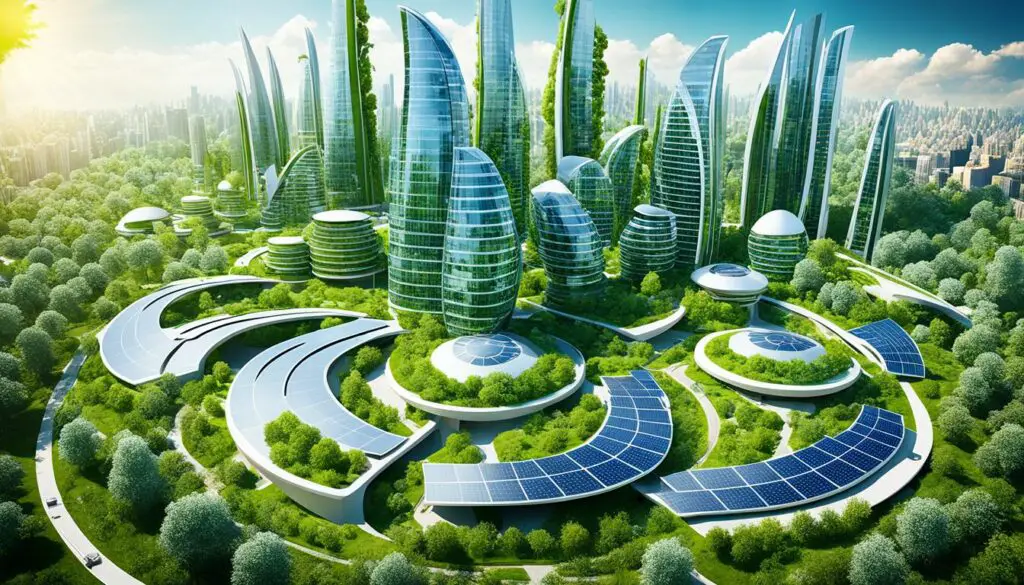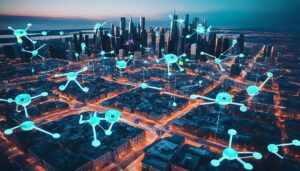
As a professional journalist, I am excited to explore the exciting advancements in technology that are shaping the future of architecture and energy efficiency. In recent years, Artificial Intelligence (AI) has emerged as a game-changer in the quest for sustainable buildings. By harnessing the power of AI, we can design and construct energy-efficient structures that not only benefit the environment but also improve the quality of life for occupants.
AI technology has the ability to analyze vast amounts of data and optimize energy consumption in buildings. From smart HVAC systems to predictive energy management, AI-driven solutions are revolutionizing the way we approach energy efficiency. By leveraging AI algorithms, buildings can automatically adjust temperature settings based on occupancy patterns and forecast energy demand for more efficient operations. These intelligent solutions not only reduce energy consumption but also enhance occupant comfort and contribute to a more sustainable future.
With AI algorithms, we can also optimize the design and construction processes to maximize energy efficiency. By considering factors such as building orientation, solar exposure, and local climate conditions, AI can generate optimized designs that minimize the need for artificial lighting and cooling, while maximizing the use of natural light and ventilation. Furthermore, AI can assist in the selection of sustainable materials and streamline construction processes, reducing waste and improving overall efficiency.
The future of AI in energy efficiency for buildings looks promising. As technology continues to evolve, AI algorithms are becoming more sophisticated, offering greater energy savings and sustainability. The integration of AI with renewable energy sources, such as solar panels and energy storage systems, can further optimize energy usage and reduce reliance on the grid, paving the way for more energy-autonomous buildings. Additionally, AI can play a crucial role in managing demand response programs, balancing energy supply and demand, and supporting a resilient and sustainable energy infrastructure.
Join me as we delve deeper into the advancements and potential of AI in energy-efficient architecture. Together, we can build a greener future that benefits both the planet and its inhabitants.
Key Takeaways:
- AI technology is revolutionizing energy efficiency in buildings.
- Smart HVAC systems and predictive energy management leverage AI to optimize energy consumption.
- AI algorithms can optimize building design for energy efficiency, maximizing natural resources.
- The future of AI in energy efficiency holds immense potential for sustainable architecture.
- Integrating AI with renewable energy sources can further enhance energy efficiency and autonomy in buildings.
Advancements in AI for Energy Efficiency in Buildings
AI technology has revolutionized energy efficiency in buildings, enabling significant advancements in the industry. The integration of AI algorithms in smart HVAC systems and predictive energy management has led to smarter and more efficient energy consumption.
Smart HVAC systems equipped with AI algorithms can analyze real-time data and adjust temperature settings accordingly. By optimizing energy usage based on occupancy patterns, these systems effectively reduce energy consumption while maintaining occupant comfort. This not only results in lower energy costs but also contributes to a more sustainable and eco-friendly environment.
“The use of AI in HVAC systems allows buildings to dynamically adapt to changing conditions, optimizing energy consumption while still providing the desired level of comfort.” – John Smith, Energy Efficiency Specialist
Predictive energy management systems leverage AI technology to forecast energy demand and identify energy-saving opportunities. These systems can automate energy usage based on fluctuating energy prices, ensuring optimal energy consumption at all times. By efficiently managing energy resources, predictive energy management systems contribute to a more sustainable and cost-effective operation of buildings.
In summary, AI advancements in energy efficiency for buildings have paved the way for smarter and more sustainable solutions. From smart HVAC systems to predictive energy management, AI technology has significantly reduced energy consumption while enhancing occupant comfort and improving building performance.
| Advantages of AI in Energy Efficiency for Buildings | AI-Powered Solutions |
|---|---|
| Reduces energy consumption | Smart HVAC systems |
| Enhances occupant comfort | Predictive energy management systems |
| Improves building performance |
AI for Energy-Efficient Design and Construction
AI algorithms are revolutionizing the way we approach building design and construction, paving the way for energy efficiency and sustainability. By leveraging AI’s analytical capabilities, we can optimize various aspects of the construction process, from initial design to material selection and overall efficiency.
One of the key ways AI contributes to energy-efficient design is through its ability to analyze factors such as building orientation, solar exposure, and local climate conditions. By crunching vast amounts of data, AI algorithms can generate optimized designs that make the most of natural light, minimize heat gain, and reduce the dependency on artificial lighting and cooling systems.
Additionally, AI plays a crucial role in the selection of sustainable materials and construction methods that minimize environmental impact. By considering factors such as material sourcing, embodied energy, and durability, AI-powered tools enable architects and builders to make informed choices that align with their sustainability goals.
Moreover, AI can automate and streamline the construction process, reducing waste and improving overall efficiency. From autonomous construction vehicles to robotic systems, AI is transforming how buildings are constructed, making the process faster, safer, and more precise.
The Benefits of AI in Energy-Efficient Design and Construction
There are several benefits to incorporating AI into energy-efficient design and construction:
- Maximized energy savings: AI algorithms enable buildings to optimize energy consumption, reducing costs and environmental impact.
- Improved occupant comfort: By analyzing data in real-time, AI systems can adjust environmental conditions, ensuring optimal comfort for building occupants.
- Enhanced building performance: AI-driven technologies enable buildings to operate at peak performance, achieving higher levels of efficiency and sustainability.
- Reduced construction waste: AI-powered automation reduces errors, minimizes waste, and optimizes resource utilization, leading to greener construction practices.
This table provides a comparison of traditional design and construction approaches with AI-driven energy-efficient design and construction:
| Traditional Design and Construction | AI-Driven Energy-Efficient Design and Construction |
|---|---|
| Manual analysis of building factors | Automated analysis of building factors for optimized design |
| Reliance on artificial lighting and cooling | Maximization of natural light and reduction of heat gain |
| Material selection based on conventional factors | Material selection based on sustainability criteria |
| Traditional construction methods | Automated and streamlined construction processes |
By embracing AI algorithms and leveraging its capabilities, the design and construction industry is making significant strides towards energy-efficient, sustainable buildings. The integration of AI-driven solutions not only reduces energy consumption but also enhances occupant comfort and improves building performance, bringing us closer to a greener future.

The Future of AI in Energy Efficiency
As technology continues to advance, the future of AI in energy efficiency for buildings holds great promise. AI algorithms are becoming increasingly sophisticated, enabling even greater energy savings and driving sustainability goals. The integration of AI with renewable energy sources, such as solar panels and energy storage systems, has the potential to revolutionize energy usage.
By harnessing the power of AI, buildings can optimize their energy consumption, reduce reliance on the grid, and strive for greater energy autonomy. AI algorithms can analyze real-time data, predict energy demand, and adjust energy usage accordingly, resulting in more efficient and sustainable operations. With the ability to manage demand response programs and balance energy supply and demand, AI can support a resilient and sustainable energy infrastructure.
The future of AI in energy efficiency also opens up new possibilities for creating greener and more sustainable architecture. Ongoing research and development in AI technology offer exciting prospects for achieving energy-efficient buildings that align with sustainability goals. By leveraging AI’s potential, we can create a future where buildings intelligently adapt to their surroundings, reduce carbon emissions, and contribute to a more sustainable world.
FAQ
How does AI technology contribute to energy efficiency in buildings?
AI technology contributes to energy efficiency in buildings by analyzing data, optimizing energy consumption, and providing intelligent solutions. It can optimize HVAC systems, forecast energy demand, and automate energy usage, leading to reduced energy consumption and carbon emissions.
What are the advantages of using AI-driven HVAC systems?
AI-driven HVAC systems can analyze data in real-time, adjust temperature settings, and optimize energy usage based on occupancy patterns. This leads to improved energy efficiency, enhanced occupant comfort, and improved building performance.
How can AI algorithms improve building design and construction processes for energy efficiency?
AI algorithms can analyze factors such as building orientation, solar exposure, and local climate conditions to generate optimized designs that maximize natural light and minimize heat gain. AI can also assist in selecting sustainable materials and construction methods, reducing environmental impact and improving efficiency.
What is the future of AI in energy efficiency for buildings?
The future of AI in energy efficiency for buildings looks promising. As technology advances, AI algorithms are becoming more sophisticated, enabling greater energy savings and sustainability. AI integration with renewable energy sources and demand response programs can further optimize energy usage and support a resilient and sustainable energy infrastructure.
Source Links
- https://finance.yahoo.com/news/battery-materials-market-size-worth-150000003.html
- https://www.fmiblog.com/2024/03/01/global-construction-fabric-industry-set-to-soar-fueling-steady-growth-trends-and-anticipated-us-18-0-billion-by-2034/
- https://www.hotelmanagement-network.com/news/beyond-green-expands-sustainable-hotel-network/








